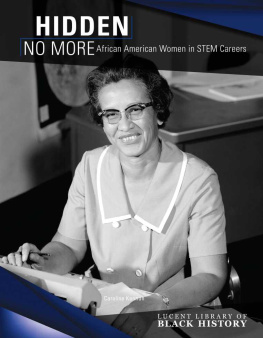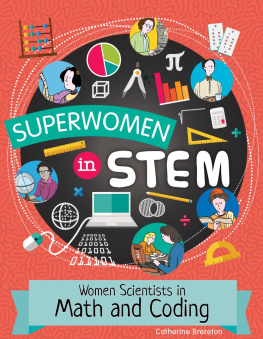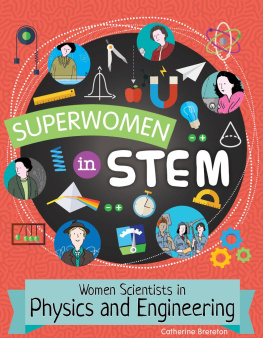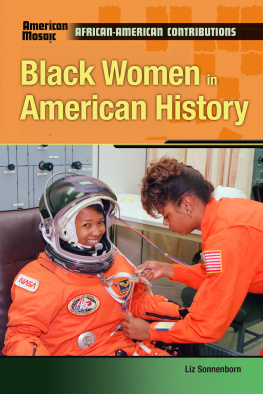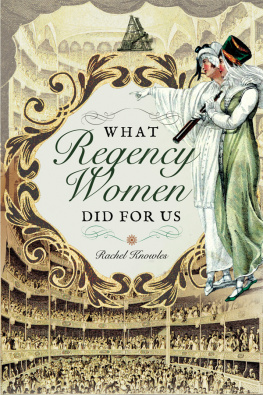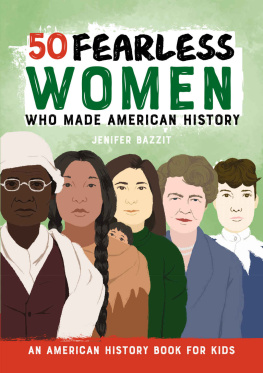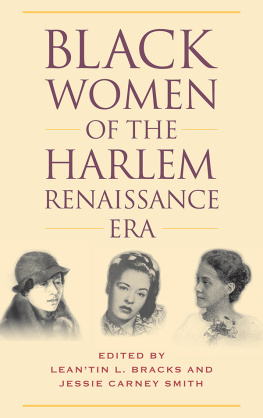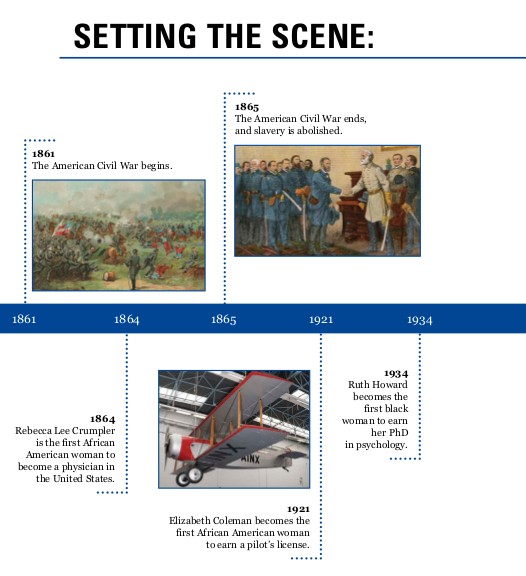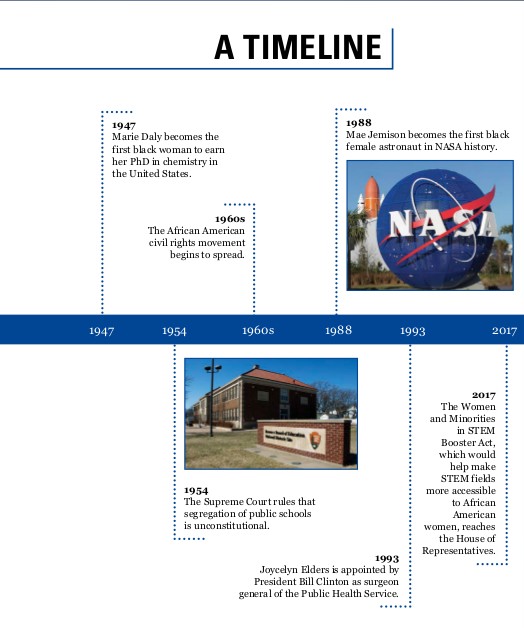Published in 2018 by
Lucent Press, an Imprint of Greenhaven Publishing, LLC
353 3rd Avenue Suite 255
New York, NY 10010
Copyright 2018 Lucent Press, an Imprint of Greenhaven Publishing, LLC.
All rights reserved. No part of this book may be reproduced in any form without permission in writing from the publisher, except by a reviewer.
Designer: Deanna Paternostro Editor: Siyavush Saidian
Library of Congress Cataloging-in-Publication Data
Names: Kennon, Caroline, author.
Title: Hidden no more : African American women in STEM careers / Caroline Kennon.
Other titles: African American women in STEM careers Description: New York : Lucent Press, c2018. | Series: Lucent library of Black history | Includes bibliographical references and index.
Identifiers: LCCN 2017041200 | ISBN 9781534562431 (library bound book) | ISBN 9781534562950 (paperback book)
Subjects: LCSH: African American women scientists-Biography. | Women scientists-United States-Biography.
Classification: LCC Q130 .K46 2018 | DDC 509.2/52-dc23 LC record available at https://lccn.loc.gov/2017041200
Printed in the United States of America
CPSIA compliance information: Batch #CW18KL: For further information contact Greenhaven Publishing LLC, New York, New York at 1-844-317-7404.
Please visit our website, www.greenhavenpublishing.com . For a free color catalog of all our high-quality books, call toll free 1-844-317-7404 or fax 1-844-317-7405.
CONTENTS
Foreword
Setting the Scene: A Timeline
FOREWORD
B lack men and women in the United States have become successful in every field, but they have faced incredible challenges while striving for that success. They have overcome racial barriers, violent prejudice, and hostility on every side, all while continuing to advance technology, literature, the arts, and much more.
From medicine and law to sports and literature, African Americans have come to excel in every industry. However, the story of African Americans has often been one of prejudice and persecution. More than 300 years ago, Africans were taken in chains from their home and enslaved to work for the earliest American settlers. They suffered for more than two centuries under the brutal oppression of their owners, until the outbreak of the American Civil War in 1861. After the dust settled four years later and thousands of Americansboth black and whitehad died in combat, slavery in the United States had been legally abolished. By the turn of the 20th century, with the help of the 13th, 14th, and 15th Amendments to the U.S. Constitution, African American men had finally won significant battles for the basic rights of citizenship. Then, with the passage of the groundbreaking Civil Rights Act of 1964, many people of all races began to believe that America was finally ready to start moving toward a more equal future.
These triumphs of human equality were achieved with help from brave social activists such as Frederick Douglass, Martin Luther King Jr., and Maya Angelou. They all experienced racial prejudice in their lifetimes and fought by writing, speaking, and peacefully acting against it. By exposing the suffering of the black community, they brought the United States together to try and remedy centuries worth of wrongdoing. Today, it is important to learn about the history of African Americans and their experiences in modern America in order to work toward healing the divide that still exists in the United States. This series aims to give readers a deeper appreciation for and understanding of a part of the American story that is often left untold.
Even before the legal emancipation of slaves, black culture was thriving despite many attempts to suppress it. From the 1600s to the 1800s, slaves developed their own cultural perspective. From music, to language, to art, slaves began cultivating an identity that was completely unique. Soon after these slaves were granted citizenship and were integrated into American society, African American culture burst into the mainstream. New generations of authors, scholars, painters, and singers were born, and they spread an appreciation for black culture across America and the entire world. Studying the contributions of these talented individuals fosters a sense of optimism. Despite the cruel treatment and racist attitudes they faced, these men and women never gave up, changing the world with their determination and unique voice. Discovering the triumphs and tragedies of the oppressed allows readers to gain a clearer picture of American history and American cultural identity.
Here to help young readers with this discovery, this series offers a glimpse into the lives and accomplishments of some of the most important and influential African Americans across historical time periods. Titles examine primary source documents and quotes from contemporary thinkers and observers to provide a full and nuanced learning experience for readers. With thoroughly researched text, unique sidebars, and a carefully selected bibliography for further research, this series is an invaluable resource for young scholars. Moreover, it does not shy away from reconciling the brutality of the past with a sense of hopefulness for the future. This series provides critical tools for understanding more about how black history is a vital part of American history.
INTRODUCTION
FROM INEQUALITY TO OPPORTUNITY
A cross countless cultures and time periods, inequality has existed. Fortunately, many recognize the inequalities that continue to exist and make great efforts to erase them. Throughout history, there have been many attempts to correct injustices done to groups of people. The American Revolution saw the birth of a country filled with citizens who dreamed of a self-governing future. Those who fought the British for independence wanted more freedoms for themselves and future generations. Then, almost 100 years later, another war was waged that acknowledged that freedom had not been given to every American citizen. The American Civil War was a very important and long overdue attempt to correct the tragic wrong of slavery, committed against generations of African Americans.
Although more than 150 years have passed since the Civil War ended and slavery was abolished, the inequality that initially existed has never completely disappeared. Prejudices and racism still exist.
In addition, women have consistently struggled throughout American history to gain positions of power and respect that are given to men automatically. Women had to fight for their right to vote in the 20th century, much like black men did in the 19th century. Considering these two groups have faced significant hurdles in their attempts to gain equal rights, black women would seem to face the biggest struggle of all.
African American women have always needed to work extra hard to achieve greatnessespecially when pursuing goals that are traditionally pursued by white men. Historically, black women have been extremely underrepresented in many industries. This is particularly true of STEM careers. STEM is an acronym that stands for science, technology, engineering, and math. In the 21st century, it is not unusual to see black women as scientists, astronauts, engineers, and doctors. As recently as 50 years ago, however, it was almost unheard of. Women traditionally either stayed home to raise children without pursuing a career at all, or they became teachers, secretaries, or career assistants. Black women often had to find domestic work, such as cooking and cleaning for other families.

